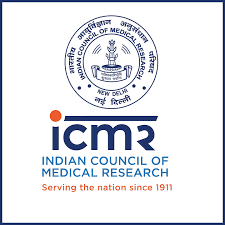


Published in nutrition
Published in nutrition



May 10, 2024
May 10, 2024
May 10, 2024
"ICMR's Latest Dietary Recommendations: Prioritizing Natural Nutrients Over Protein Supplements, Added Sugar and Salt"
"ICMR's Latest Dietary Recommendations: Prioritizing Natural Nutrients Over Protein Supplements, Added Sugar and Salt"
"ICMR's Latest Dietary Recommendations: Prioritizing Natural Nutrients Over Protein Supplements, Added Sugar and Salt"
ICMR has released a new set of dietary guidelines, saying that around 56.4% of the total disease burden in India is because of unhealthy diet habits. On Wednesday, the Indian Council of Medical Research (ICMR) unveiled a series of dietary guidelines tailored specifically for Indians. These guidelines aim to address the nation's nutritional needs and combat the prevalence of noncommunicable diseases. Shockingly, unhealthy dietary habits contribute to approximately 56.4% of India's total disease burden.
ICMR has released a new set of dietary guidelines, saying that around 56.4% of the total disease burden in India is because of unhealthy diet habits. On Wednesday, the Indian Council of Medical Research (ICMR) unveiled a series of dietary guidelines tailored specifically for Indians. These guidelines aim to address the nation's nutritional needs and combat the prevalence of noncommunicable diseases. Shockingly, unhealthy dietary habits contribute to approximately 56.4% of India's total disease burden.
ICMR has released a new set of dietary guidelines, saying that around 56.4% of the total disease burden in India is because of unhealthy diet habits. On Wednesday, the Indian Council of Medical Research (ICMR) unveiled a series of dietary guidelines tailored specifically for Indians. These guidelines aim to address the nation's nutritional needs and combat the prevalence of noncommunicable diseases. Shockingly, unhealthy dietary habits contribute to approximately 56.4% of India's total disease burden.

In its extensive 148-page report featuring 17 guidelines, the institute advocates for a shift in dietary habits, suggesting a reduction in cooking oil usage in favor of obtaining essential fatty acids from sources like nuts, oilseeds, and seafood. Highlighting the detrimental effects of excessive consumption of highly processed foods rich in sugars and fats, coupled with sedentary lifestyles and limited access to diverse food options, the report underscores the prevalence of micronutrient deficiencies and overweight issues in the nation.
Among its array of recommendations, the report stresses the importance of moderating salt intake, practicing moderation in consuming oils and fats, engaging in regular physical activity, and minimizing sugar and ultra-processed food consumption. It suggests an optimal daily sugar intake of 20-25 grams, sourced primarily from natural carbohydrates, to address the nation's nutritional needs effectively.

Here are 17 ICMR guidelines for Indians:
Eat a variety of foods to ensure a balanced diet
Ensure provision of extra food and healthcare during pregnancy and lactation
Ensure exclusive breastfeeding for the first six months and continue breastfeeding till two years and beyond
Start feeding homemade semi-solid complementary foods to the infant soon after six months of age
Ensure adequate and appropriate diets for children and adolescents both in health and sickness
Eat plenty of vegetables and legumes
Use oils/fats in moderation; choose a variety of oil seeds, nuts and legumes to meet daily needs of fats and essential fatty acids (EFA)
Obtain good quality proteins and essential amino acids (EAA) through appropriate combination of foods and avoid protein supplements to build muscle mass
Adopt a healthy lifestyle to prevent abdominal obesity, overweight and overall obesity
Be physically active and exercise regularly to maintain good health
Restrict salt intake
Consume safe and clean foods
Adopt appropriate pre-cooking and cooking methods
Drink adequate quantity of water
Minimize the consumption of high fat, sugar, salt (HFSS) and ultra-processed foods (UPFs)
Include nutrient-rich foods in the diets of the elderly for health and wellness
Read information on food labels to make informed and healthy food choice.

In its extensive 148-page report featuring 17 guidelines, the institute advocates for a shift in dietary habits, suggesting a reduction in cooking oil usage in favor of obtaining essential fatty acids from sources like nuts, oilseeds, and seafood. Highlighting the detrimental effects of excessive consumption of highly processed foods rich in sugars and fats, coupled with sedentary lifestyles and limited access to diverse food options, the report underscores the prevalence of micronutrient deficiencies and overweight issues in the nation.
Among its array of recommendations, the report stresses the importance of moderating salt intake, practicing moderation in consuming oils and fats, engaging in regular physical activity, and minimizing sugar and ultra-processed food consumption. It suggests an optimal daily sugar intake of 20-25 grams, sourced primarily from natural carbohydrates, to address the nation's nutritional needs effectively.

Here are 17 ICMR guidelines for Indians:
Eat a variety of foods to ensure a balanced diet
Ensure provision of extra food and healthcare during pregnancy and lactation
Ensure exclusive breastfeeding for the first six months and continue breastfeeding till two years and beyond
Start feeding homemade semi-solid complementary foods to the infant soon after six months of age
Ensure adequate and appropriate diets for children and adolescents both in health and sickness
Eat plenty of vegetables and legumes
Use oils/fats in moderation; choose a variety of oil seeds, nuts and legumes to meet daily needs of fats and essential fatty acids (EFA)
Obtain good quality proteins and essential amino acids (EAA) through appropriate combination of foods and avoid protein supplements to build muscle mass
Adopt a healthy lifestyle to prevent abdominal obesity, overweight and overall obesity
Be physically active and exercise regularly to maintain good health
Restrict salt intake
Consume safe and clean foods
Adopt appropriate pre-cooking and cooking methods
Drink adequate quantity of water
Minimize the consumption of high fat, sugar, salt (HFSS) and ultra-processed foods (UPFs)
Include nutrient-rich foods in the diets of the elderly for health and wellness
Read information on food labels to make informed and healthy food choice.

In its extensive 148-page report featuring 17 guidelines, the institute advocates for a shift in dietary habits, suggesting a reduction in cooking oil usage in favor of obtaining essential fatty acids from sources like nuts, oilseeds, and seafood. Highlighting the detrimental effects of excessive consumption of highly processed foods rich in sugars and fats, coupled with sedentary lifestyles and limited access to diverse food options, the report underscores the prevalence of micronutrient deficiencies and overweight issues in the nation.
Among its array of recommendations, the report stresses the importance of moderating salt intake, practicing moderation in consuming oils and fats, engaging in regular physical activity, and minimizing sugar and ultra-processed food consumption. It suggests an optimal daily sugar intake of 20-25 grams, sourced primarily from natural carbohydrates, to address the nation's nutritional needs effectively.

Here are 17 ICMR guidelines for Indians:
Eat a variety of foods to ensure a balanced diet
Ensure provision of extra food and healthcare during pregnancy and lactation
Ensure exclusive breastfeeding for the first six months and continue breastfeeding till two years and beyond
Start feeding homemade semi-solid complementary foods to the infant soon after six months of age
Ensure adequate and appropriate diets for children and adolescents both in health and sickness
Eat plenty of vegetables and legumes
Use oils/fats in moderation; choose a variety of oil seeds, nuts and legumes to meet daily needs of fats and essential fatty acids (EFA)
Obtain good quality proteins and essential amino acids (EAA) through appropriate combination of foods and avoid protein supplements to build muscle mass
Adopt a healthy lifestyle to prevent abdominal obesity, overweight and overall obesity
Be physically active and exercise regularly to maintain good health
Restrict salt intake
Consume safe and clean foods
Adopt appropriate pre-cooking and cooking methods
Drink adequate quantity of water
Minimize the consumption of high fat, sugar, salt (HFSS) and ultra-processed foods (UPFs)
Include nutrient-rich foods in the diets of the elderly for health and wellness
Read information on food labels to make informed and healthy food choice.